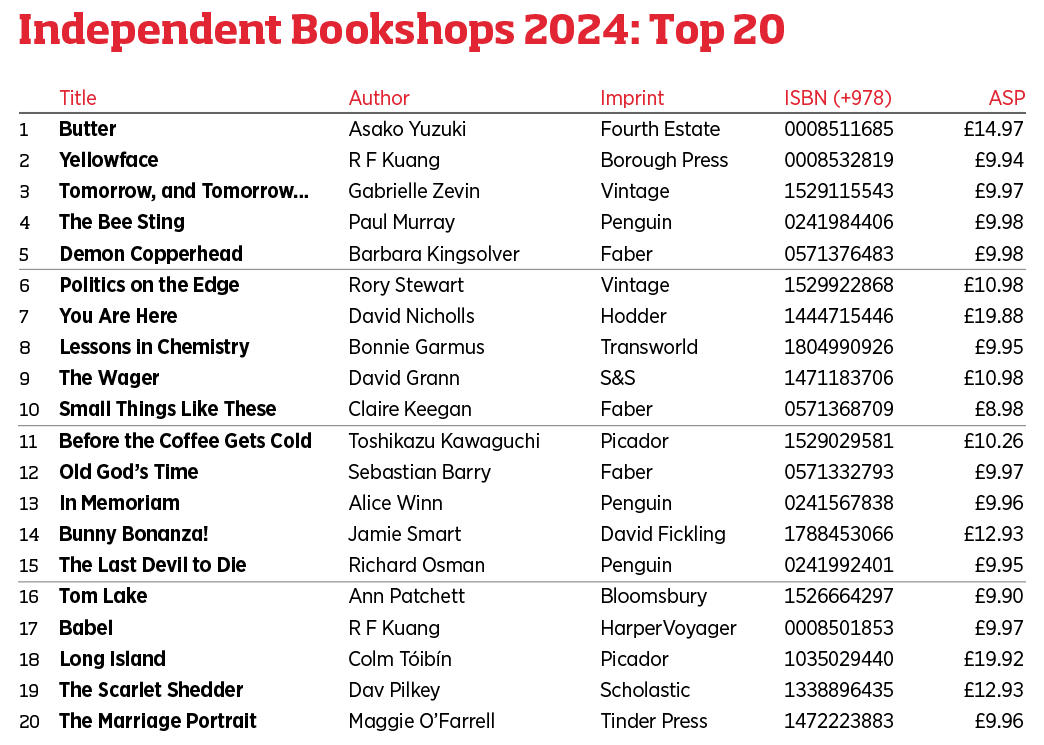Butter churns up the independent charts
Asako Yuzuki’s breakout hit leads the literary wave

Tom Tivnan is the managing editor of The Bookseller.
Literary fiction, cult novels and prize picks have been big winners at independent bookshops’ tills this year, with non-fiction barely getting a look-in.
That indies shade towards the literary will not be earth-shattering to many, but it is interesting to note just how much the channel over-indexes towards this side of the sector, at least at the very top. Of the top 50 titles sold through Nielsen BookScan’s Independent Retailers chart thus far in 2024, 25 come from the General & Literary Fiction category; and this does not include the seven titles coded for other genres, such as Claire Keegan’s Antarctica (Short Stories & Fiction Anthologies), Zadie Smith’s The Fraud and Tan Twan Eng’s The House of Doors (both Historical & Mythological Fiction), which could be considered literary fiction. Compare that to the overall BookScan Total Consumer Market Top 50 which has just four General & Literary entries.
Meanwhile, the commercial workhorse of the trade—Crime, Thriller & Adventure—has 17 spots on the full-market TCM Top 50, versus just one from that category with indies: Richard Osman’s retail channel-crossing The Last Devil to Die.
The indies’ number one in 2024, Asako Yuzuki’s Butter (translated by Polly Barton), illustrates the point of difference. A cult Japanese novel examining that country’s institutional misogyny through the lens of a cause célèbre murder mystery while satirising its foodie culture does not exactly scream instant bestseller. But indies—and, to be fair, Waterstones—have taken the book to their bosom. It is tops with indies, while 51st in the overall TCM, shifting just under 91,000 units market-wide. BookScan cannot reveal retail channel share, so this top 20 has no volume figures, but indies have unquestionably been essential to Butter’s overall success.
It is not unusual that Butter has a 50-spot differential comparing its Independent Retailer chart position with the full TCM: half of this top 20 has a greater disparity, led by Colm Tóibín’s 18th-placed Long Island, which is 318th in the overall TCM. Only Osman is in a lower position in the indie chart than the wider TCM (at nearly 300,000 units, The Last Devil to Die is by far the UK’s bestselling book of the year), while Dav Pilkey’s The Scarlet Shedder is 19th in both league tables.
There is, even the grumpiest shop owners would probably agree, a remora/shark beneficial relationship between indies and Waterstones, particularly initially as the chain’s buy-in enables publishers to plump for more significant print runs. A title like Gabrielle Zevin’s third-paced Tomorrow, and Tomorrow, and Tomorrow is a case in point. Its real initial breakthrough was in July 2023 when Waterstones made it Book of the Month. Yes, independents were all in with the title last summer, but have continued to support it for the long term, with Zevin’s book entering 2024 with five consecutive number ones on the Independent Retailer chart.
Somewhat ironically, the only other book with more than two weekly Independent Retailer pole positions this year has been Rory Stewart’s Politics on the Edge, which equals Zevin’s five—ironic, as non-fiction has not particularly set indies alight this year. David Grann’s The Wager is the only other non-fiction in the top 20 while just three other books from the sector feature in the top 50: Alice Roberts’ Crypt (Simon & Schuster), Fern Brady’s Strong Female Character (Brazen) and poet laureate Simon Armitage’s Angela Harding-illustrated Blossomise (Faber).













